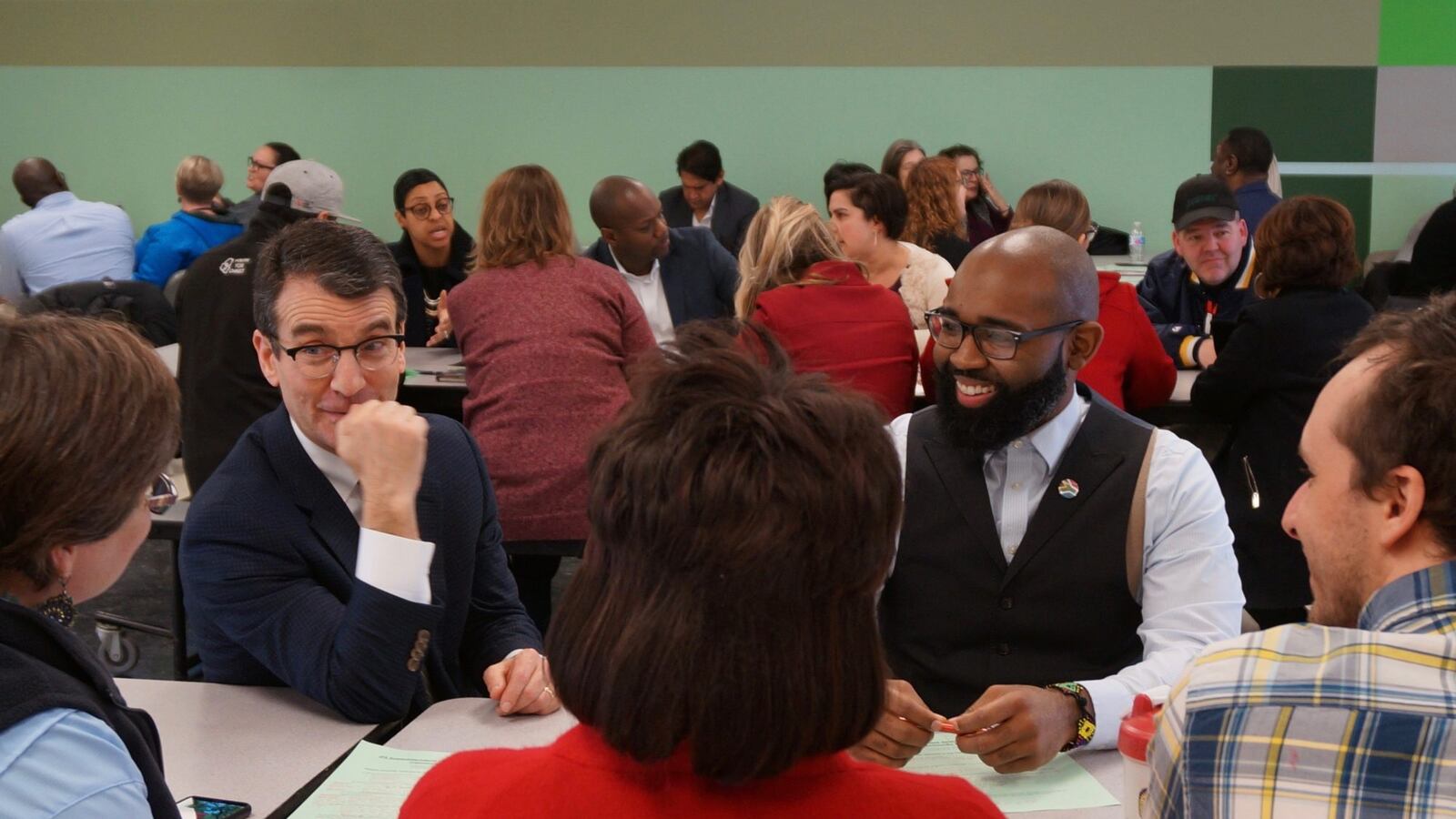Indianapolis Public Schools parents, educators, and residents have started weighing in on what they would like to see in their next superintendent, but so far there is no clear consensus on what kind of leader the board should seek.
This week is something of an unofficial kickoff in the search for a new superintendent, as the school board held its first of three planned community meetings Wednesday. The session came on the heels of another meeting hosted Monday by several community groups, including the IPS Community Coalition, which was critical of former Superintendent Lewis Ferebee’s collaboration with charter schools.
The search for a new superintendent is a turning point for the district, which embraced radical changes under Ferebee, who left to take the helm of the Washington, D.C., school system. During his five-year tenure, the district closed underenrolled high schools, gave more power to principals, and created innovation schools, which are run by outside managers but considered part of the district. Those changes have been polarizing, however, winning praise from some quarters and igniting opposition from others.
In recent weeks, there has been friction over the search process. The school board president originally floated the idea of a quick search, but that drew a backlash from critics of Ferebee’s administration, who raised concerns that a fast search might favor interim Superintendent Aleesia Johnson, who served as Ferebee’s deputy superintendent. The board eventually approved a longer process designed to allow significant community input, and it is expected to choose a superintendent in May.
As the district searches, a central question is whether it will choose a leader who will continue its current direction or one who will slow or halt its partnerships with charter schools. But community members are divided.
At Monday’s meeting, which was attended by many critics of the current administration, several residents spoke out against innovation schools.
“We have been sent down a private partnership line with innovation all throughout our community, and it has killed us, and it’s killed public school education,” said Shaune Shelby, the pastor of Ebenezer Baptist Church.
But at the district-hosted meeting Wednesday, there was more support for innovation schools, which now enroll about one in four Indianapolis Public Schools students.
Ali King, who leads Central Indiana Youth for Christ, said that she likes the innovation schools, and she believes there is a lot of good work happening in them. Moreover, she said, “we’ve gone too far down the road” to go back to the traditional approach for running a district.
Darius Sawyers, an Indianapolis Public Schools graduate who is expected to lead a planned charter school, said he wanted a superintendent who is committed to Indianapolis and will help ensure all students have access to high-quality schools. He said he doesn’t care whether the district continues to partner with charters or finds ways to improve its own schools, “as long as we are providing high-quality seats to students, I’m good there.”
Numerous community members who are critical of Ferebee’s administration have also said that they believe the next superintendent should have experience leading a district and should have a superintendent license, something that is not required under Indiana law. Ferebee has a superintendent license according to state records, although he did not have experience leading a district prior to Indianapolis. His predecessor, Eugene White, formerly led a nearby district.
Both issues hint at opposition to Johnson’s selection for the job, although Johnson has not said whether she plans to apply for the position.
“What has she got that would make you willing to put her in without that particular credential?” asked Sandy Reiberg.
In a press release last month, the community coalition said that Johnson’s experience and qualifications “are lacking” and “a superintendent license is non-negotiable.”
In an email, Johnson said that it is up to the board to decide what qualifications the next superintendent needs. But, she wrote, “in addition to 16 years of experience in education, I have earned a Bachelor of Arts, Master of Social Work, and Master of Arts in Teaching degrees thus far in my career.”
Stand for Children, a parent organizing group that supports innovation schools, also released a survey Wednesday of residents, parents, and teachers views on the search. It found wide support for selecting a superintendent who has had success working with students from similar demographics as those in Indianapolis Public Schools, which is about 44 percent African American, 29 percent Hispanic, and 21 percent white.
The survey also found that about 55 percent of respondents want “a diverse candidate who reflects the IPS community,” and about half prefer a search that focuses on local candidates.
If the board prioritizes finding a local candidate or a candidate of color, that could weigh in Johnson’s favor. She is the first African-American woman to lead the district.
The search process is also raising less ideological issues among residents.
Sabae Martin, a community member at the meeting Monday, said that she would like to see a superintendent who has experience teaching in Indianapolis and is engaged with the community.
“What this superintendent is doing is trying to heal some hurts that have taken place,” Martin said of whoever is selected.
While the next leader does not need to be from Indianapolis to earn King’s support, she said it’s essential for them to be someone who is committed to the community and does not leave as quickly as Ferebee did.
“I think I would probably be concerned if it was somebody who was on a track to always bigger and better,” King said. “Our kids deserve someone that’s gonna be in it for the long haul.”

